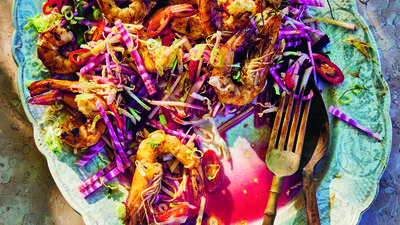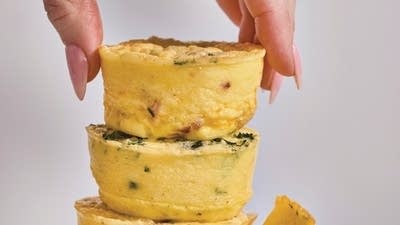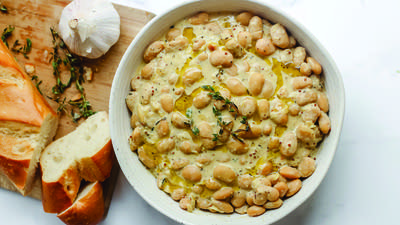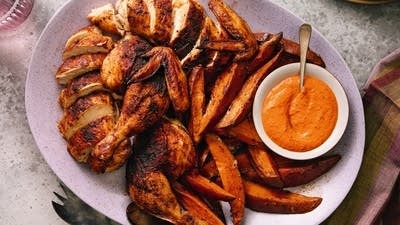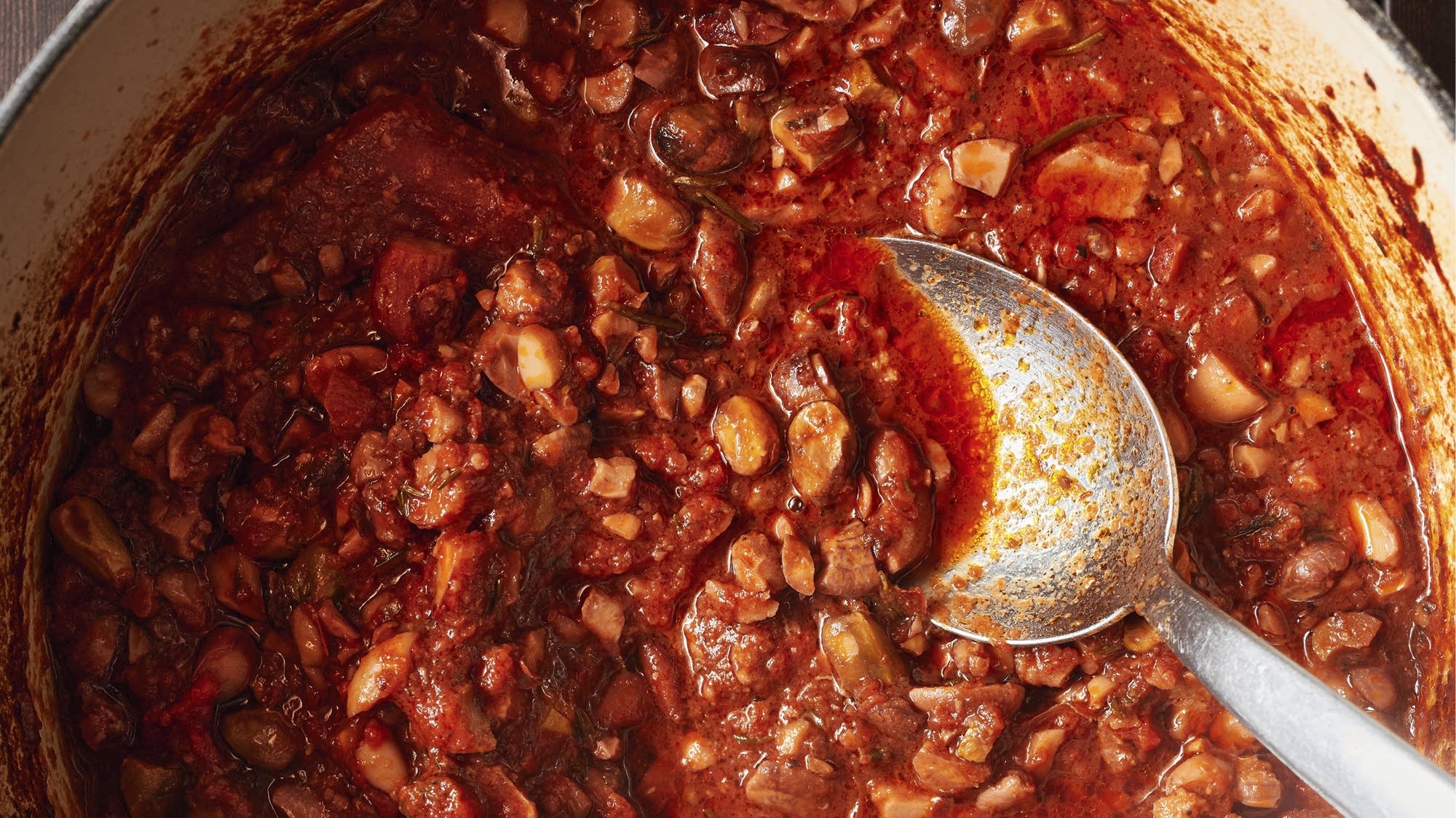
I came up with this crazy creation around ten years ago at an Italian restaurant I owned in Portland, Oregon. I don’t think of it as substitute for a meat ragu, nor do I really think of it as a vegan dish (though it is). It’s simply a nut ragu, a unique recipe that is happy to be its own delicious thing.
Take your time while you toast the nuts in olive oil. You don’t want to overcook them, because too dark equals bitter, and nuts are expensive, so you don’t want to have to start over.
This sauce is delicately chunky (no, that’s not an oxymoron), so I like a noodle that has curls and crevices for the nuts to grab on to. Some favorites include busiate, which are tight short spirals, and strozzapreti, which are looser, hand-rolled medium-short tubes that capture ragus nicely.
Makes about 3 cups (725 g), enough to sauce 6 portions of pasta
INGREDIENTS:
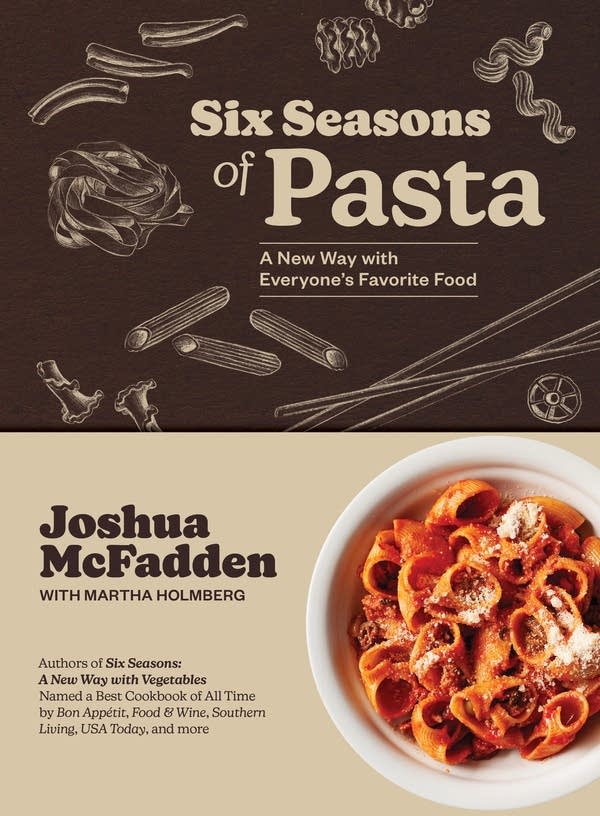 Six Seasons of Pasta: A New Way with Everyone's Favorite Food
Joshua McFadden
Six Seasons of Pasta: A New Way with Everyone's Favorite Food
Joshua McFadden
½ cup (60 g) raw almonds (skinless if possible)
½ cup (60 g) raw cashews
½ cup (60 g) raw hazelnuts (skinless, if possible)
½ cup (60 g) raw pistachios
½ cup (60 g) raw walnuts
½ cup (120 ml) extra-virgin olive oil
4 or 5 garlic cloves, smashed
½ teaspoon finely chopped fresh rosemary
½ teaspoon finely chopped fresh thyme
¼ teaspoon freshly ground black pepper, plus more to taste
⅛ teaspoon dried chile flakes, plus more to taste
Kosher salt (preferably Diamond Crystal)
1 ½ tablespoons tomato paste
2 ½ cups (625 g) canned whole peeled tomatoes, crushed by hand, with their juices
DIRECTIONS:
Chop the almonds, cashews, hazelnuts, pistachios, and walnuts with a chef’s knife or a mezzaluna until they are fairly fine but not at all powdery. You want bits of varying sizes. You can also chop them by pulsing them in a food processor.
Heat the oven to 300°F (150°C).
Heat the olive oil in a heavy-bottomed ovenproof pot with a lid, such as a Dutch oven, over medium heat. Add the garlic and cook gently until it softens, 4 to 5 minutes, breaking it up a bit with your spatula; don’t let it actually brown.
Add the chopped nuts and cook gently, stirring frequently, until the nuts are beginning to toast, 3 to 5 minutes; they should be fragrant and very light brown but not super toasty, as they will continue to cook in the sauce. Take care that the garlic isn’t starting to get too brown; if it is, reduce the heat a bit.
Add the rosemary, thyme, black pepper, chile flakes, and 1 teaspoon kosher salt.
Add the tomato paste, spreading it around on the surface of the pan, and cook until it’s slightly darkened (but make sure you’re not overbrowning the nuts or garlic). Stir until the nuts are evenly coated with the tomato paste.
Add the crushed tomatoes and their juices and stir to combine everything. Bring to a simmer and cook for 2 to 3 minutes, then cover the pot with a lid (or foil) and transfer to the oven.
Cook until the nuts are very soft, the tomato sauce has reduced and concentrated in flavor, and the whole thing is a nicely integrated sauce, 1 1/2 to 2 hours. Check a few times during cooking to give everything a stir and add a bit of water if it seems like the sauce is drying out.
Let the sauce cool slightly, then transfer about one-quarter of the sauce to a blender. Blend until smooth, then fold back into the sauce. (You can also use a handheld immersion blender and just eyeball it.) Taste and adjust the seasoning with more salt, pepper, or chile flakes if needed.
Let the ragu cool completely, then divide it into 1-cup (250 g) portions (enough to sauce 8 ounces/225 g dried noodles, or two servings). Use now (the ragu will last for up to 5 days in the refrigerator) or freeze for up to 4 months.
Excerpted from Six Seasons of Pasta by Joshua McFadden with Martha Holmberg (Artisan Books). Copyright © 2025. Photographs by AJ Meeker. Illustrations by Abe Naylor.
When you shop using our links, we earn a small commission. It’s a great way to support public media at no extra cost to you.
Before you go...
Each week, The Splendid Table brings you stories that expand your world view, inspire you to try something new, and show how food connects us all. We rely on your generous support. For as little as $5 a month, you can have a lasting impact on The Splendid Table. And, when you donate, you’ll join a community of like-minded individuals who love good food, good conversation, and kitchen companionship. Show your love for The Splendid Table with a gift today.
Thank you for your support.
Donate today for as little as $5.00 a month. Your gift only takes a few minutes and has a lasting impact on The Splendid Table and you'll be welcomed into The Splendid Table Co-op.
